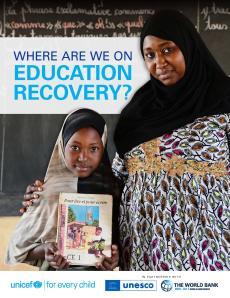
EU adopts new rules to significantly cut packaging waste with re-use targets
The European Union has formally adopted a regulation on packaging and packaging waste. The new ...

“With a combined 2 trillion hours of in-person schooling lost due to school closures since March 2020, students in more than 4 in 5 countries have fallen behind in their learning. Less well-off children have seen their learning falling back. In particular, the most marginalized – those living in poverty and rural areas, children with disabilities, and the youngest students – have fallen the furthest behind.”
“Basic, foundational skills upon which every aspect of education is built have been erased in many countries. Children have forgotten how to read and write; some are unable to recognize letters. Children who were poised to start school for the first time never got the chance to learn these skills in the first place, as early childhood education disappeared in most countries. Without urgent remedial action, this could carry serious lifelong consequences in terms of health and well-being, future learning and employment.”
“While we have seen pockets of data that point to a staggering number of children not returning to school once their classrooms reopened, some countries are not collecting or not able to collect information on how many children have or have not returned to school, so we are flying blind. A quarter of low-income countries – already with high out-of-school populations – do not have the data to show how many students have returned to school.”
“The alarm was sounded many times. Six months into the pandemic, with a lack of access to remote learning, we already knew that at least a third of schoolchildren globally were completely cut off from their education. We knew that some 24 million children and youth were at risk of dropping out altogether. We knew child labor and child marriage would rise. And yet, not enough is being done to help children recover what they’ve lost.”
“At a time when it’s needed the most, education funding has and continues to fall desperately short. Countries allocated on average 3 percent of their COVID-19 stimulus packages to education. In low- and lower-middle-income countries, the allocation was less than 1 percent.”
“While countries scramble to recover, they are overlooking the single, most-effective long-term recovery and sustainability tool – education.”
“Governments must double down on efforts to get every child into school. Education is a fundamental human right. The multiple and intersecting barriers – including poverty, cultural norms, and poor quality teaching – preventing children from accessing their education must be broken down. Every child needs to be assessed on their learning and based on the results, they must have access to quality, tailored, catch-up classes to recover what they’ve lost and beyond. Teaching should be adjusted to the level they currently are at in their learning. Teachers must be given the training, support and resources they need. And finally, schools must go beyond places of learning and support children’s well-being and safety.”
“This is a now-or-never moment to act and transform education in order to save this generation.”
The European Union has formally adopted a regulation on packaging and packaging waste. The new ...
Inaugurating the Abydos Solar Power Plant in the Upper Egypt governorate of Aswan represents a ...
Businesses that fail to adapt to climate risks like extreme heat could lose up to ...


اترك تعليقا